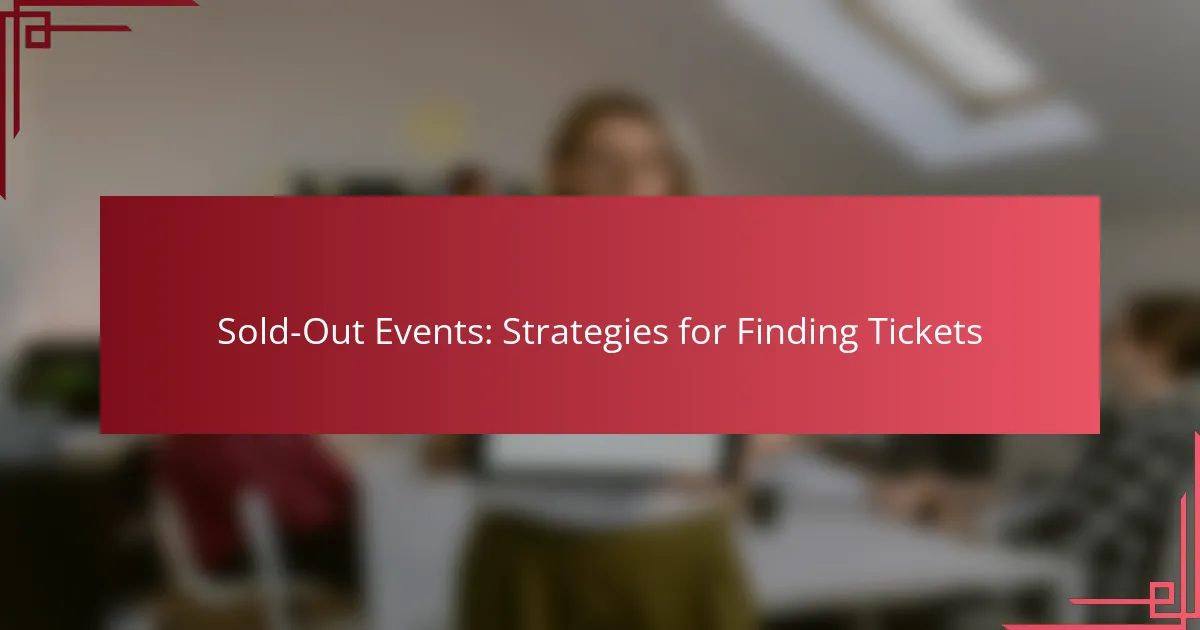Finding tickets for sold-out events can be a daunting task, but with the right strategies, you can improve your chances of success. Utilizing resale platforms, setting up alert services, and engaging with fan clubs are effective ways to secure those elusive tickets. Additionally, monitoring social media for giveaways and checking the venue box office can lead to last-minute opportunities at reasonable prices.
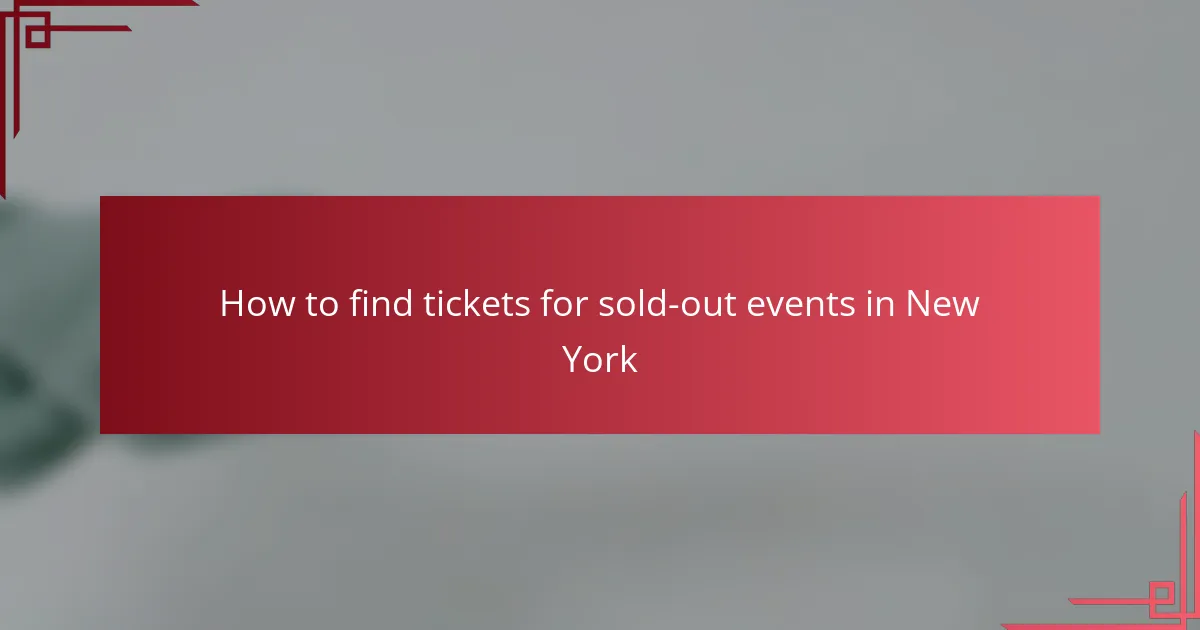
How to find tickets for sold-out events in New York
Finding tickets for sold-out events in New York can be challenging but not impossible. Utilizing various strategies can increase your chances of securing a ticket, whether through resale platforms, alert services, or fan clubs.
Check resale platforms like StubHub
Resale platforms such as StubHub offer a marketplace for individuals to buy and sell tickets for events, including those that are sold out. Prices can vary significantly, so it’s wise to compare listings to find the best deal.
Keep an eye on the platform for last-minute ticket drops, as sellers may reduce prices as the event date approaches. Be prepared to act quickly, as desirable tickets can sell out fast.
Use ticket alert services
Ticket alert services notify you when tickets become available for sold-out events. Websites like Ticketmaster and Eventbrite often have alert options that can be customized based on your preferences.
Setting up alerts can help you snag tickets as soon as they are released, especially if you are flexible with your event choices. Make sure to check your email or app notifications regularly to stay updated.
Join fan clubs for exclusive access
Joining fan clubs or subscribing to newsletters for your favorite artists or teams can provide exclusive access to tickets before they go on sale to the general public. Many clubs offer pre-sale opportunities that can significantly increase your chances of getting a ticket.
Additionally, fan clubs often share insider information about upcoming events and ticket availability, giving you an edge over the general public. Look for membership options that offer these benefits to enhance your ticket-buying experience.
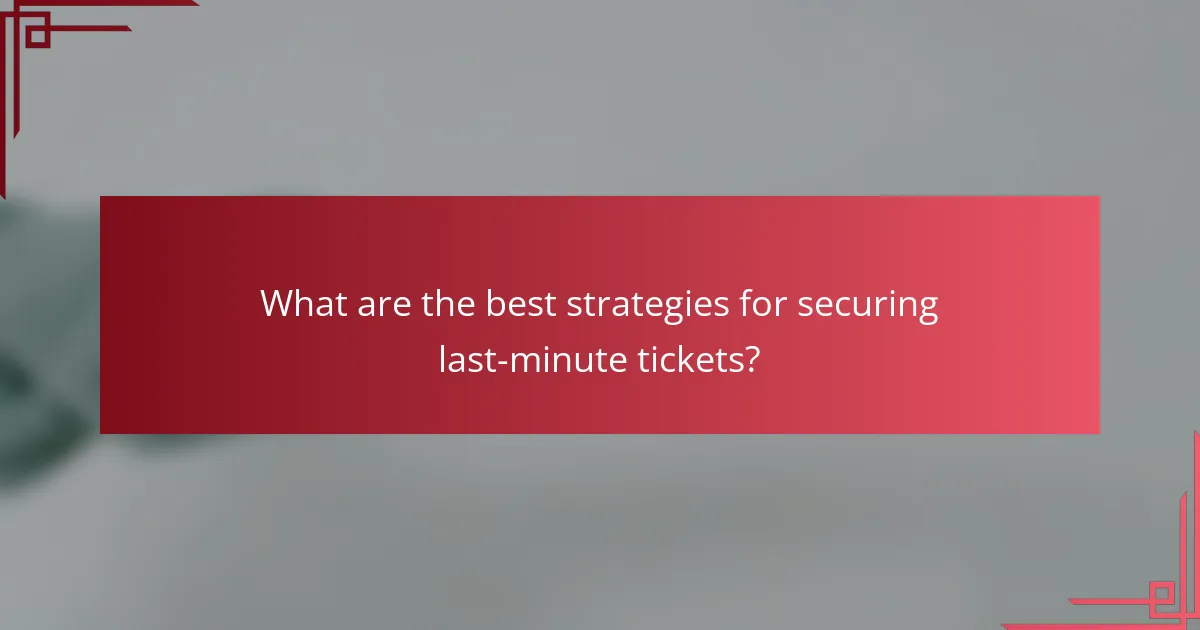
What are the best strategies for securing last-minute tickets?
To secure last-minute tickets for sold-out events, consider proactive strategies such as monitoring social media for giveaways and visiting the venue box office directly. These methods can increase your chances of finding available tickets at reasonable prices.
Monitor social media for giveaways
Social media platforms are often used by event organizers and artists to promote ticket giveaways. Follow official accounts related to the event, such as the venue, performers, or promoters, to stay updated on any announcements.
Engage with posts and participate in contests to enhance your chances of winning tickets. Many giveaways require simple actions like sharing a post or tagging friends, making it easy to enter.
Visit the venue box office
Going directly to the venue box office can be a practical way to find last-minute tickets. Box offices sometimes release a limited number of tickets on the day of the event, especially if there are no-shows.
Arrive early and check for any available tickets. It’s also wise to inquire about standing room options, which can be more affordable and still provide a great experience.
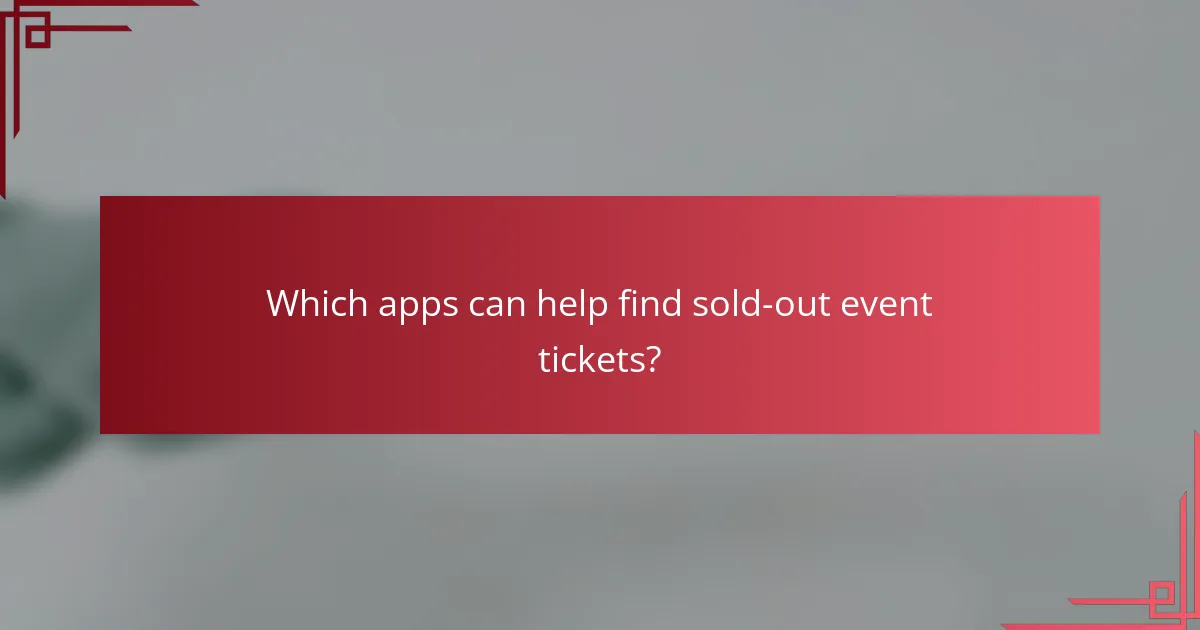
Which apps can help find sold-out event tickets?
Several apps specialize in helping users locate tickets for sold-out events. These platforms aggregate listings from various sources, making it easier to find available tickets at competitive prices.
Use SeatGeek for price comparisons
SeatGeek is an excellent tool for comparing ticket prices across multiple vendors. By entering the event details, users can view a variety of ticket options, including their prices and seating locations.
One of the standout features of SeatGeek is its interactive seating chart, which allows you to visualize where your seats will be. This can help you make informed decisions based on price and view quality.
To maximize savings, check SeatGeek regularly as prices can fluctuate significantly, especially as the event date approaches. Setting up alerts for specific events can also notify you when prices drop.
Try Gametime for last-minute deals
Gametime focuses on providing last-minute ticket deals, making it a great option for spontaneous plans. The app often features discounted tickets that can be purchased just hours before the event starts.
Users can benefit from Gametime’s “Flash Deals,” which offer significant savings on tickets that are about to go unsold. This is particularly useful for popular events where ticket availability is limited.
However, be aware that while prices can be lower, the selection might be limited, and you may not find the best seats available. Always check the event details and seating options before purchasing to ensure a satisfactory experience.
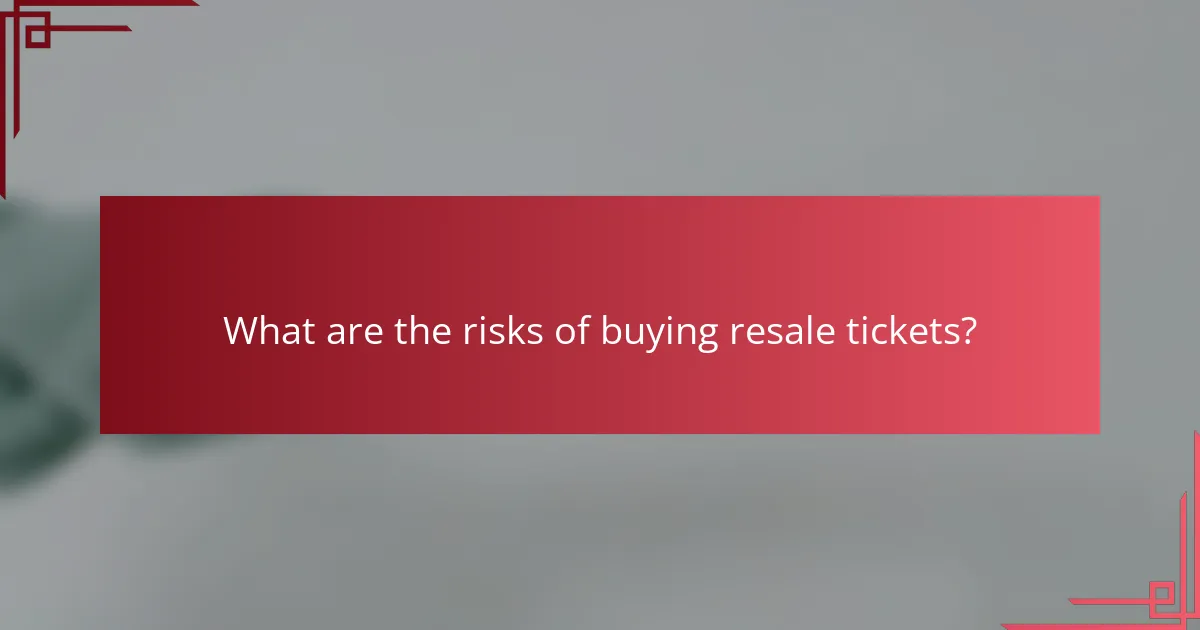
What are the risks of buying resale tickets?
Buying resale tickets can expose you to several risks, including the possibility of counterfeit tickets and inflated prices. It’s essential to understand these risks to make informed decisions when seeking tickets for sold-out events.
Potential for counterfeit tickets
One of the main risks of purchasing resale tickets is the potential for counterfeits. Unscrupulous sellers may offer fake tickets that appear legitimate but will not grant entry to the event. Always verify the seller’s reputation and consider using platforms that guarantee authenticity.
To minimize the risk of counterfeits, look for tickets sold through reputable sources or those that provide a money-back guarantee. If possible, check if the venue offers a way to verify the ticket’s validity through a unique code or barcode.
Higher prices than face value
Resale tickets often come at a premium, frequently exceeding the original face value. This markup can vary significantly based on demand, with prices sometimes reaching two to three times the original cost. Be prepared for this possibility when shopping for sold-out event tickets.
To avoid overpaying, set a budget before searching for resale tickets and compare prices across multiple platforms. Consider waiting until closer to the event date, as prices may drop if sellers are eager to offload tickets. However, this approach carries the risk of missing out entirely if the event sells out again.
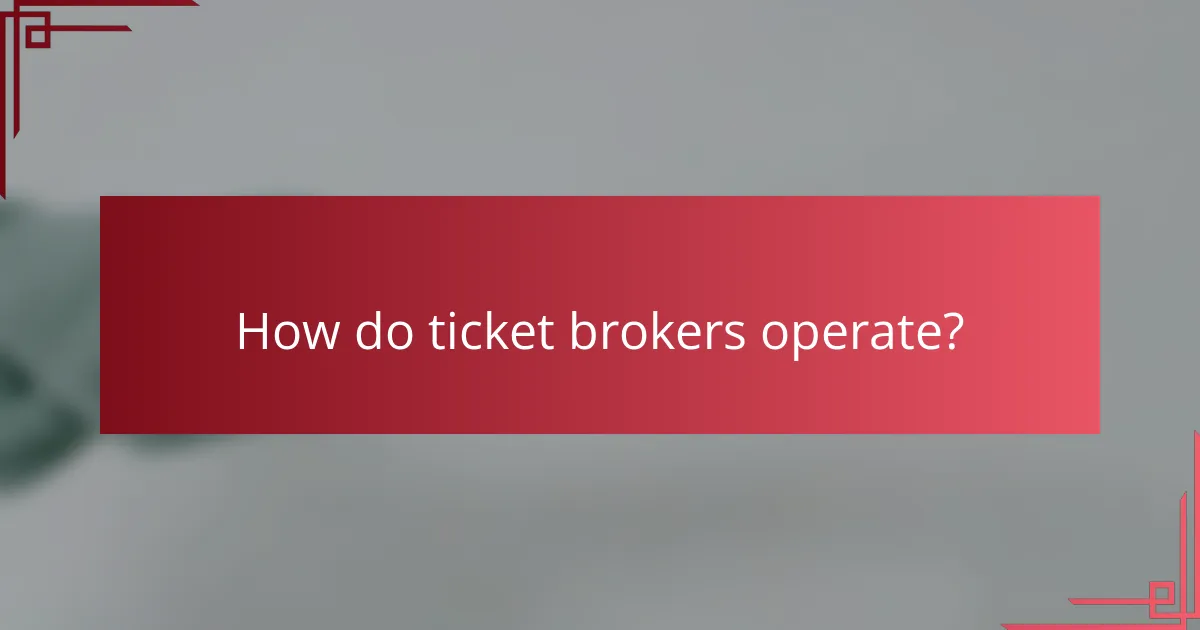
How do ticket brokers operate?
Ticket brokers act as intermediaries who buy and sell tickets for events, often capitalizing on high demand. They acquire tickets in bulk, typically during initial sales, and then resell them at a markup to consumers who are unable to secure tickets directly.
They buy bulk tickets to resell
Ticket brokers often purchase large quantities of tickets when they first become available, using automated systems to increase their chances of securing them. This bulk buying allows brokers to control a significant portion of the ticket supply, which they can then sell at higher prices as demand increases.
For example, if a concert sells out quickly, brokers may have hundreds of tickets available for resale. This practice can lead to inflated prices, sometimes exceeding the original ticket cost by several times, depending on the event’s popularity.
They often charge service fees
In addition to the ticket price, brokers frequently impose service fees that can add a substantial amount to the final cost. These fees cover various operational costs, including transaction processing and customer service.
Service fees can vary widely, often ranging from 10% to 30% of the ticket price. It’s essential for buyers to factor in these additional costs when budgeting for tickets, as they can significantly impact the overall expense of attending an event.
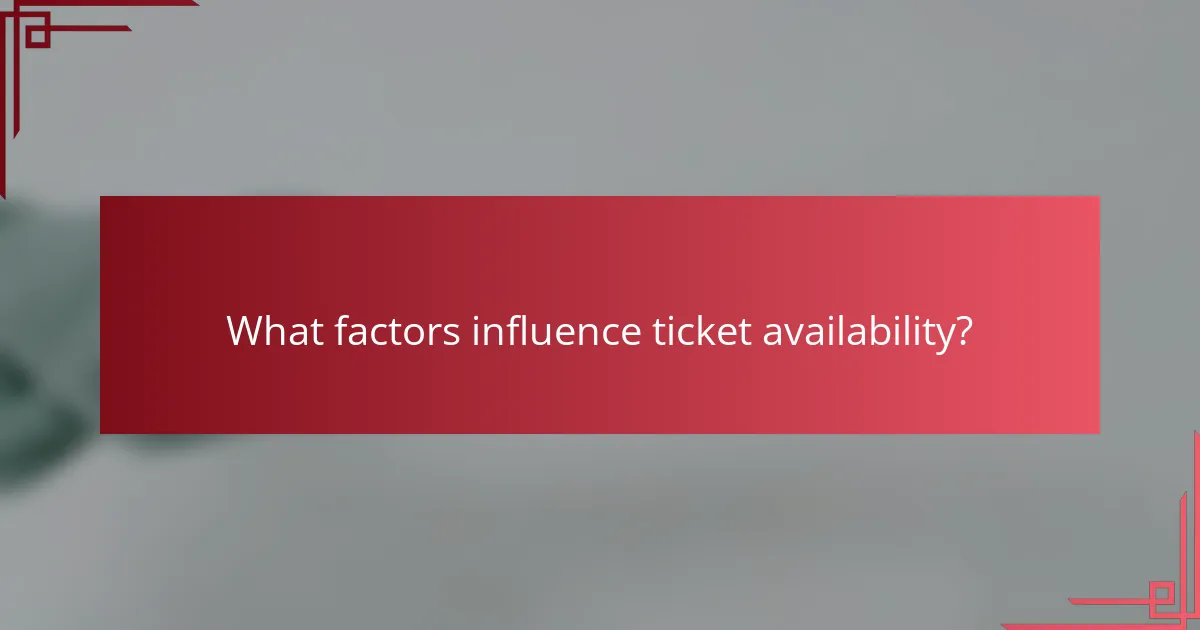
What factors influence ticket availability?
Ticket availability is primarily influenced by event popularity, demand, venue capacity, and seating arrangements. Understanding these factors can help you navigate the ticket-buying process more effectively.
Event popularity and demand
The popularity of an event significantly impacts ticket availability. High-demand events, such as concerts by major artists or championship games, often sell out quickly, leaving limited options for late buyers.
To increase your chances of securing tickets, monitor social media buzz and ticketing platforms for announcements. Consider setting alerts for ticket releases, as they can sell out within minutes.
Venue capacity and seating arrangements
Venue capacity plays a crucial role in determining how many tickets are available. Smaller venues may have a few hundred seats, while larger arenas can accommodate thousands, affecting overall ticket distribution.
Additionally, seating arrangements can influence ticket availability. Premium seats often sell out first, so consider looking for tickets in less popular sections or for general admission options. Understanding the layout can help you find available tickets more easily.
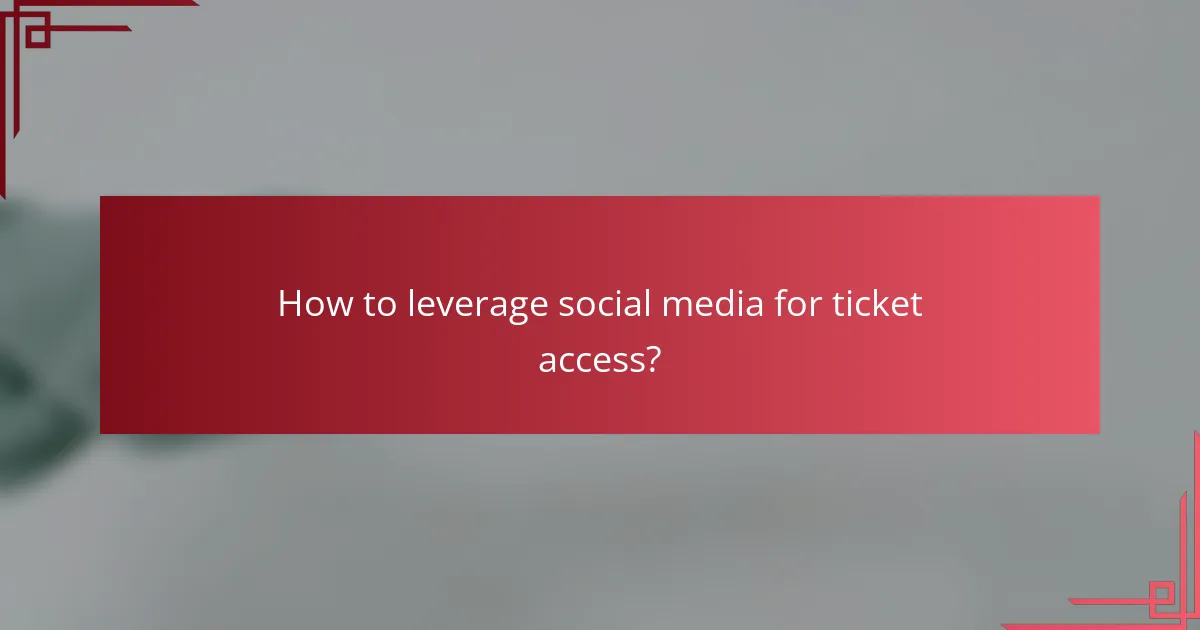
How to leverage social media for ticket access?
Social media can be a powerful tool for gaining access to sold-out event tickets. By following specific accounts, joining groups, and utilizing alerts, you can increase your chances of finding available tickets.
Follow official event pages and ticket vendors
Start by following the official pages of the event and ticket vendors on platforms like Twitter, Facebook, and Instagram. These accounts often post updates about ticket releases, promotions, or last-minute availability. Engaging with their posts can also enhance your visibility to any announcements.
Join relevant groups and communities
Joining groups on platforms like Facebook or Reddit that focus on specific events or ticket sales can provide insider information. Members often share tips, alerts, and even direct links to tickets as they become available. Being active in these communities can help you stay informed about ticket drops.
Set up alerts and notifications
Utilize social media features to set up alerts for specific keywords related to the event or ticket sales. For example, on Twitter, you can create lists or use hashtags to track updates. Additionally, enable notifications for posts from key accounts to ensure you don’t miss any announcements.
